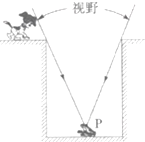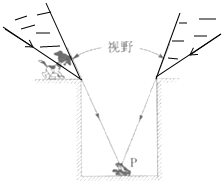问题
多选题
有一个干枯的井底正中央P点趴着一只青蛙,井上有一只狗,青蛙恰好看不到狗,他能看到的视野范围如图所示,天降大雨时井中全部灌满水,若青蛙和狗都保持原来位置不动,下列说法正确的是( )
A.发生了光的折射,青蛙可以看到狗
B.发生了光的折射,青蛙的视野范围变大
C.发生了光的折射,狗不一定能看到青蛙
D.发生了光的折射,狗一定能看到青蛙.

答案
当井里没有水时,青蛙看到的视野(左图);当井里灌满水后,光线照到镜面会发生折射现象,由于光是从空气射向水,所以入射角大于折射角,因此井底之蛙看到的视野范围比没水时会看到更大;青蛙可以看到狗,由于光的折射是可逆的,所以狗一定能看到青蛙(见右图).


故选ABD.
